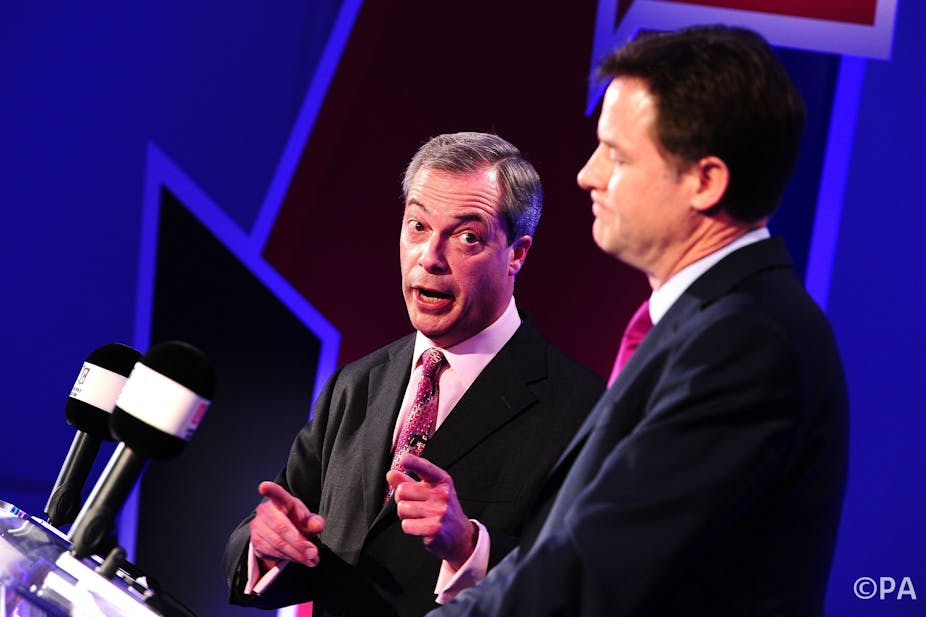The LBC debate between Nigel Farage and Nick Clegg is a significant moment in British politics for a number of reasons. It is worth considering two in particular. First, it was a curious spectacle for Clegg, the leader of a party in government and the deputy prime minister, to take on the leader of an opposing party with no MPs. Second, it was an opportunity to once again see Clegg perform in a televised debate after his successes in 2010. This time, the context is very different. He has now been bruised by government, and is no longer an innocent bystander to the two main parties’ machinations.
During the debate, Clegg told Farage to “cut out the rhetoric”, a curious statement given rhetoric is the lifeblood of any political process. Countering this, Farage kept his message simple. This is key to ensuring it resonates, because its simplicity masks the complexity of the issues being debated. Yet despite the superficial differences in their approach, both used emotional appeals as their main rhetorical device. Clegg drew more on anecdotal evidence and “witnesses” to make the case for Britain in Europe, whilst Farage tried to whip up feelings of what might be called “British exceptionalism”. Although both tried to ground their arguments in data and empirical evidence, neither strayed too far from the emotional core of their rhetorical arguments.
Clegg also argued that Britain needed to be part of the EU in order to tap into the extra weight the UK gets from being part of that trading bloc. This argument, which enjoys the support of commentators and politicians alike, failed to rattle Farage. Indeed, he argued that Clegg was doing Britain a disservice by suggesting the UK was not good enough to stand as an independent nation on the world stage.
But however wedded to the idea of “sovereignty” Farage might be, his argument disregards other challenges to the sovereignty of the British state: devolution, the prospect of Scottish independence, globalisation, and so on. The UK which Farage seems hell bent on “defending” has changed and is still changing because of factors very distinct from the EU. And put simply, an independent UK would, as Clegg said, be less Great Britain and more Little England.
Oh no EU didn’t
Farage worked hard to tie Clegg to David Cameron and Ed Miliband, arguing they all represent an establishment that wants to keep Britain in Europe regardless of public opinion. The political mainstream’s wariness of a membership referendum does clearly stem from fear of the result, but Farage’s anti-establishment line is little more than a classic straw-man attack on the political elite, similar in tone to Thatcher’s attacks on the old Etonians. It should also be noted that, according to MORI data, the issue of Europe is not as salient amongst the electorate as UKIP apparently think.
Following the debate, pollsters congratulated Farage on apparently winning the argument; YouGov found that 57% of 1003 voters thought Farage performed best. But it is worth considering which argument, exactly, he has won. He has won the “anti-Clegg, anti-Establishment” argument, but that is not the same as winning the EU argument. Farage’s performance and dramatic style of delivery may have entertained the masses, but this should not lead us to the facile conclusion that Farage has won the intellectual or political debate over Britain in Europe.
For some, seeing the phenomenally unpopular Clegg attacked on stage will be entertainment enough, but that should not be taken as support for Farage. This is a debate which needs to be had away from the spectacle of watching the two leaders maul each other. Sadly for the Lib Dem leader, his entanglement with Cameron means progressive or left-leaning pro-EU voters will be less inclined to heed his words – and his centrist Europhilia may push more conservative and right-leaning anti-EU voters away from Cameron and towards Farage.
The LBC debate was significant, but the main show in town will be the rematch on BBC2. During that debate, Clegg will have to explain exactly why being in the EU is beneficial to the UK. Farage will likely continue to tap in to the emotive Thatcherite theme of renewing Britain’s greatness in the world. As last night’s scuffle showed, both very much have their work cut out for them.

